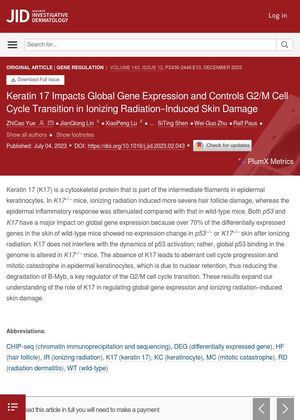Keratin 17 Impacts Global Gene Expression and Controls G2/M Cell Cycle Transition in Ionizing Radiation-Induced Skin Damage

TLDR Keratin 17 is important for skin's response to radiation, affecting many genes and cell division.
Keratin 17 (K17) plays a crucial role in the response of skin to ionizing radiation, as demonstrated by the fact that mice lacking K17 (K17−/−) experienced more severe hair follicle damage and a reduced inflammatory response compared to wild-type mice. The study found that K17, along with p53, significantly influences global gene expression, with over 70% of genes that were differentially expressed in wild-type mice not showing changes in K17−/− or p53−/− mice after exposure to ionizing radiation. Furthermore, K17 is involved in the regulation of the cell cycle, specifically the G2/M transition, by affecting the stability of B-Myb, a critical cell cycle regulator. The absence of K17 results in improper cell cycle progression and mitotic catastrophe in skin cells. These findings enhance the understanding of K17's role in gene expression regulation and the cellular response to ionizing radiation-induced skin damage.







